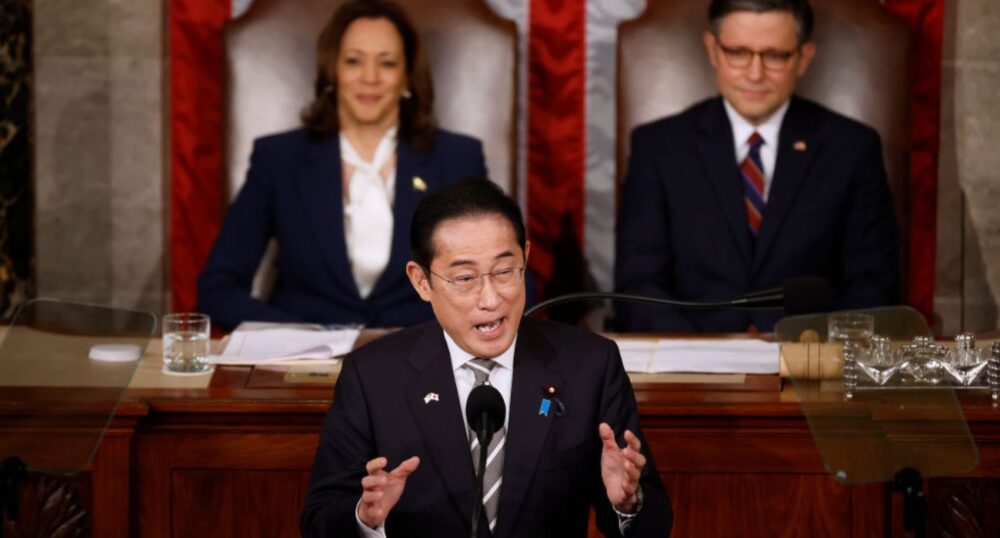Prime Minister Fumio Kishida addressed Congress on Thursday and pledged support for U.S. efforts to counter the rising threat of China.
“We are now at an inflection point that will define the next stage of human history,” Kishida said. “The international order that the U.S. worked for generations to build is facing new challenges, challenges from those with values and principles very different from ours. Freedom and democracy are under threat around the globe.”
Kishida, who spent three years living in Queens, New York, as a child in the early 1960s, said he has always appreciated the role the U.S. plays as a beacon of hope and freedom, but he sees fractures in some Americans’ dedication to global security.
“I detect an undercurrent of self-doubt among some Americans as to what your role in the world should be,” Kishida said. “This self-doubt is arising at a time when our world is at history’s turning point.”
As a symbol of the friendship between the U.S. and Japan, Kishida pledged that Japan would donate 250 cherry trees to a rehabilitation project currently underway at the Tidal Basin in Washington, D.C., to commemorate the 250th anniversary of American independence in 2026.
“The American alliance system has helped bring peace and stability to the Indo-Pacific for decades, and now we need to update and upgrade that alliance network for the modern age,” said Jake Sullivan, White House national security adviser, per The New York Times. “It goes way beyond security. It’s economics. It’s technology. It’s infrastructure development. And it’s diplomacy. And that’s all going to be on display in the meeting with the prime minister.”
American efforts to rein in China’s influence in the region date back to the Communist takeover in 1949. Before that event, China had been an ally of the U.S. and was heavily defended against the Japanese during World War II. Following the defeat of Japan and the fall of China, the roles have reversed. During his presidency, Trump took a hard-line stance against China, instituting sanctions and disrupting trade to counter the rising threat of China as a world power, as reported by Reuters.
Biden has sought closer ties with Taiwan to counter Chinese threats, expanding on Trump’s policies. The Center for Strategic and International Studies (CSIS) stated that Trump’s administration was the only administration to challenge China’s “One China Policy,” which declares the autonomous island of Taiwan as Chinese territory. CSIS reported that shortly after his election, Biden authorized a massive arms sale to Taiwan in a significant shift away from previous policies and echoing efforts by Trump to bolster Taiwan’s security.
However, in a seeming about-face, Biden recently made it clear that he does not support Taiwan independence, reported Reuters.
Biden is bolstering support for the Philippines as part of the administration’s countering of Chinese influence in the region. On Thursday, Biden and Kishida will meet with Philippines President Ferdinand Marcos Jr. to work toward bolstering relations with the Pacific island ally of the U.S.
On Sunday, the U.S., Australia, the UK, and the Philippines held joint military drills in the South China Sea. In response, China launched its own war game strategy, as reported by Al Jazeera. Chinese officials did not disclose the full details but stated that “naval and air combat patrols” would be operating in the same area.
The U.S. has recently taken numerous steps toward countering China militarily and through technology. In March, the House passed a bill that would ban TikTok over fears its parent company could share sensitive data with the Chinese government, as previously reported by The Dallas Express. China has been accused of various offenses against the U.S. in recent years, including state-funded efforts to hack government organizations and critical infrastructure, as well as attempts to influence elections.

